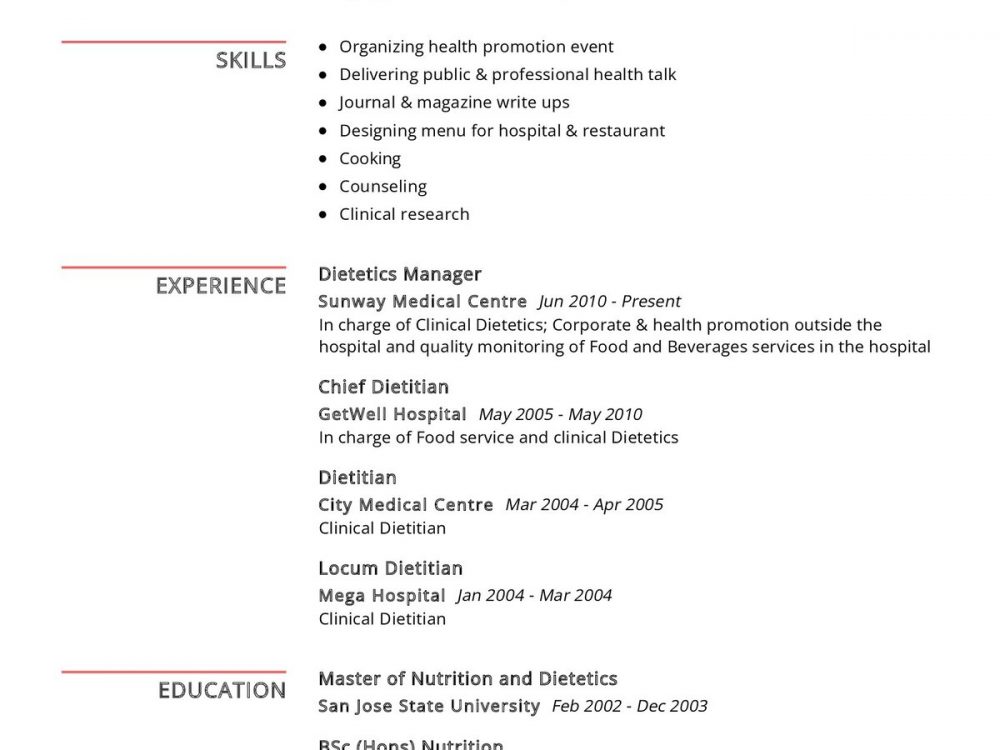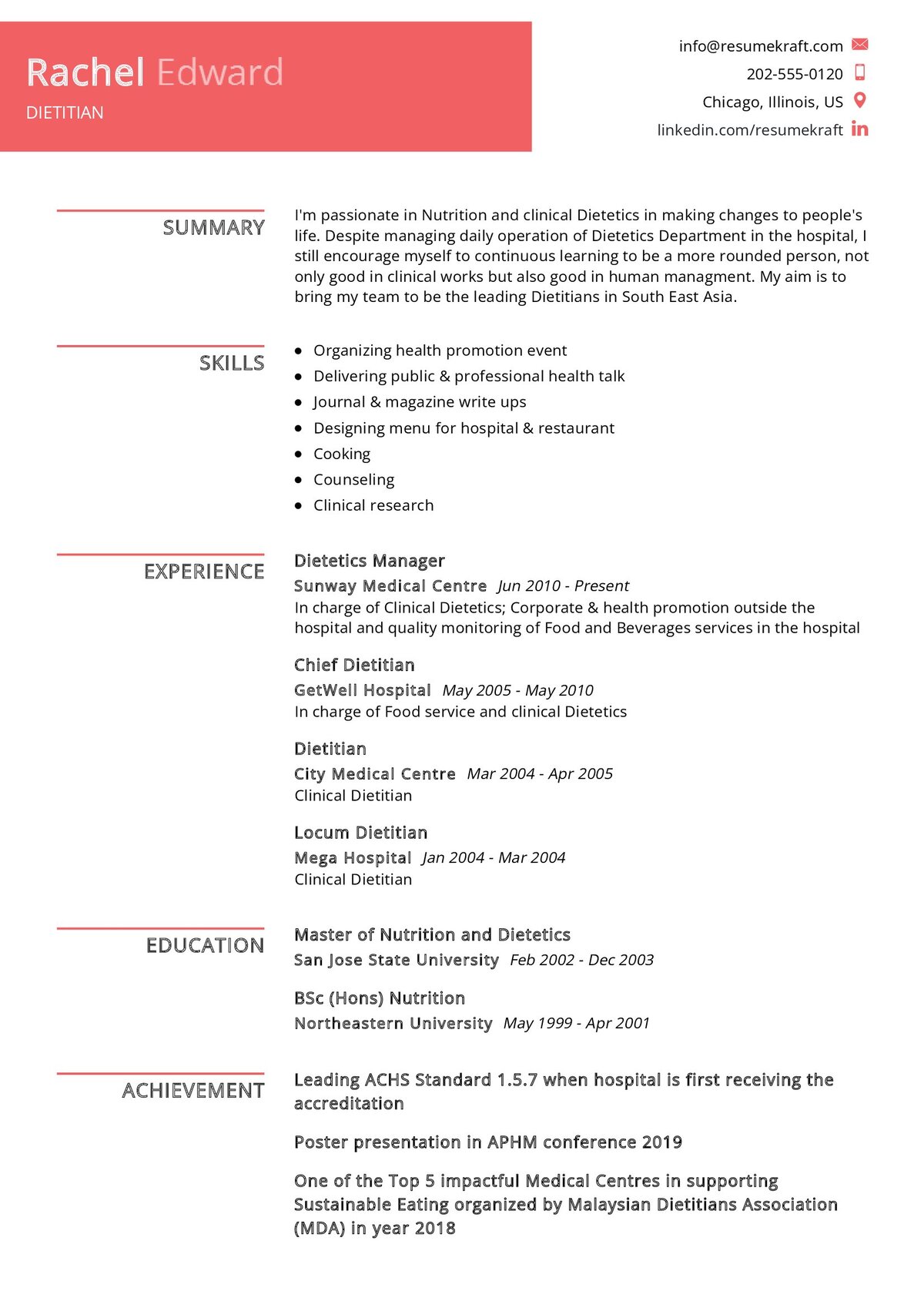What Should Be Included In A Dietitian Resume?
A dietitian’s resume is an important part of the job search process. It can make or break your chances of getting an interview and ultimately a job. As such, it’s important to get it right. When writing your dietitian resume, there are a few key things you should include in order to highlight your skills and experience in the field.
First, include your contact information at the top of your resume. This should include your name, address, phone number, and email address – making it easy for potential employers to contact you.
Next, include any certifications or licenses you have obtained related to dietetics. This will show potential employers that you have the right qualifications and expertise to do the job.
Third, include any relevant work experience. This could include internships, volunteer work, or full-time jobs. Be sure to mention the roles you played in each position and the skills you developed during those roles that make you a strong candidate for the dietitian job.
Fourth, include any additional skills or expertise that you have that may be beneficial in the dietetics field. This could include computer skills, public speaking, or knowledge of nutrition software.
Finally, list any awards or recognition that you have received in the past. This could include awards for academic achievements, professional certifications, or any other honors.
By following these steps, you can create an effective dietitian resume that will showcase your skills and experience, making you a strong candidate for the job.
What Skills Should I Put On My Resume For Dietitian?
For those looking to make a career as a dietitian, it is important to have a resume that accurately showcases the skills and experience that make you an ideal candidate for the role. It is important to include the right type of information on the resume, to ensure that the hiring manager is able to quickly and easily visualize what makes you the perfect fit for the job. Here are some of the essential skills to include in your dietitian resume:
- Knowledge of Sports Nutrition: Dietitians must have a knowledge of sports nutrition to be able to provide the best possible advice to athletes on how to optimize their performance through proper diet.
- Understanding of Dietary Guidelines: Dietitians must understand the dietary guidelines set forth by the government and be able to interpret them for their clients.
- Understanding of Human Anatomy and Physiology: Dietitians must have a knowledge of how nutrition affects the body and how it can be used to improve health and performance.
- Food Safety and Sanitation: Dietitians must be familiar with food safety and sanitation principles and be able to apply them in different food service settings.
- Nutrition Counseling Skills: Dietitians must be able to assess a patient’s nutritional needs and develop an effective plan to meet those needs. They must also be able to provide education and counseling to their clients.
- Computer Skills: Being able to use computers to create menus, track dietary plans and create nutritional reports is essential for dietitians. Being able to use software such as Microsoft Excel is a big plus.
By including all of these essential skills on your dietitian resume, you can be sure that you are presenting the best version of yourself to potential employers . You can also demonstrate your commitment to the profession and your dedication to helping others improve their health and performance.
What Is The Job Description Of The Dietitian?
A dietitian is a health professional who specializes in providing nutrition advice and guidance to individuals, families, and groups. Dietitians help people understand the role of nutrition in their overall health and well-being and assist them in making informed food choices. They create meal plans tailored to individual needs, such as age, gender, lifestyle, health conditions, and food preferences. Dietitians play an important role in managing chronic illnesses, including diabetes and obesity. They also evaluate food service operations, such as cafeterias, hospitals, and nursing homes.
Dietitians must have a thorough knowledge of food science, nutrition, and health, as well as an understanding of the cultural and social factors that can influence dietary choices. Additionally, they must have excellent communication and interpersonal skills, as well as the ability to work with clients from diverse backgrounds. A degree from an accredited college or university, as well as certification from a professional organization, is typically required to become a dietitian.
In order to be successful in the field of dietetics, a dietitian must stay up-to-date with the latest research and developments in the field. They must also be able to effectively explain nutrition concepts to clients and the public. Dietitians must be self-motivated and proactive about keeping their clients informed about nutrition. Dietitians must also be able to work in a team and be willing to take responsibility for their clients’ health.
By following the guidelines and requirements set forth, dietitians can help their clients make healthy and informed dietary choices. With the right skills, knowledge, and experience, dietitians can be a valuable asset to their clients and their families.Earning a degree in nutrition and dietetics, as well as obtaining a professional certification from a recognized organization, are important steps in becoming a successful dietitian.
What Is A Good Objective For A Dietitian Resume?
A dietitian’s resume is an important document that can be used to showcase their professional experience and skill set. It is the first impression they make on potential employers, so it is important to ensure it is well written and accurately reflects the individual’s qualifications. The objective section of a dietitian’s resume is an integral part of the document and should be tailored specifically to the individual.
When writing an objective for a dietitian resume, it is important to emphasize the desired position, as well as the individual’s qualifications and skills. For example, a dietitian may state an objective to “utilize my experience in clinical nutrition, public health nutrition, and health promotion to help improve the lives of my clients.” This statement not only offers insight into the individual’s career goals, but it also reveals the dietitian’s ability to effectively manage and promote health.
It is also important to include any certifications or specializations that the dietitian has acquired. For example, if the individual has a certification in sports nutrition, this should be included in the objective statement. This will help demonstrate their commitment to their profession and make them stand out from other applicants.
Finally, the objective should emphasize the individual’s desire to be part of an organization and make a positive impact. A dietitian may state an objective to “contribute to a team of health professionals dedicated to providing top-quality nutrition services in the community.” This statement conveys the dietitian’s commitment to their profession, as well as their desire to make a difference in the lives of their clients.
The objective of a dietitian should emphasize the individual’s commitment to nutrition and health promotion. This should include the desire to effectively manage and promote health through nutrition counseling, meal planning and education. Additionally, the objective should reflect any certifications or specializations the dietitian has acquired to demonstrate their commitment to their profession and their desire to be an active part of a larger health care team.
What Are The Career Prospects In The Dietitian?
The healthcare sector is rapidly growing, with dietitians increasingly in demand as the focus on health and nutrition becomes more important. As a dietitian, you are responsible for educating clients about nutrition and creating meal plans that promote health and wellness. Becoming a dietitian can be a great career choice for those interested in health and nutrition. With the right educational background, professional experience, and expertise, you can become a successful dietitian.
The job market for dietitians is expected to grow significantly over the next decade. Dietitians often work in hospitals, health care centers, research centers, and private practice. In addition, some dietitians choose to work in the food industry, teaching others about healthier eating options or providing consulting services. As a dietitian, you will be expected to provide nutrition advice, develop meal plans, and address nutritional needs.
The field of nutrition is constantly changing, so dietitians must stay up-to-date on the latest research and trends. To become a successful dietitian, you must have extensive knowledge of nutrition and be able to communicate effectively with clients. If you are interested in becoming a dietitian, you must have a strong understanding of nutrition science and be well-versed in dietary guidelines and regulations. Additionally, dietitians must have excellent interpersonal skills and be able to collaborate with other professionals in the healthcare field.
The outlook for dietitians is bright, and with the right knowledge and expertise, you can have a successful career. If you are interested in becoming a dietitian, make sure to research the educational requirements, gain experience in the field, and build a professional network . Nutrition science is constantly y changing, so dietitians must stay up-to-date on the latest research and trends. They must have a comprehensive understanding of nutrition principles, the ability to analyze and interpret data, and the capacity to develop and implement nutritional plans.
Key Takeaways for an Dietitian resume
A dietitian’s resume should accurately reflect their professional qualifications, as this document is often the first impression that hiring managers have of you. With this in mind, it is important for those interested in pursuing a career as a dietitian to pay special attention to the details when creating and editing their resume.
When writing your dietitian resume, it is important to include all of the relevant information that goes into a successful resume. This includes a professional summary, educational background, and relevant skills, experience, and certifications. Additionally, it is important to use language that is clear, concise, and easy to read. For example, use language that is familiar to the hiring manager, such as “nutrition” or “dietetics,” instead of using terms that are too technical.
It is also important to include any relevant awards and certifications that you have earned, as well as any professional development activities you have participated in. Additionally, make sure that you accurately reflect your work experience and volunteer experience, as these are important elements of a successful dietitian resume. Finally, be sure to include any special skills or knowledge that you possess that is relevant to the job opening.
By ensuring that your dietitian resume is professional and organized, you will be able to make a positive first impression with potential employers. Additionally, by showcasing the qualifications and skills that make you the ideal candidate for the job, you will increase your chances of getting an interview.
Lastly, the objective should also emphasize the individual’s desire to be part of an organization and make a positive impact, by providing quality nutrition services to their clients and the community at large.Furthermore, they must be able to create educational materials that are easy to understand and follow, and they must have excellent communication skills.


